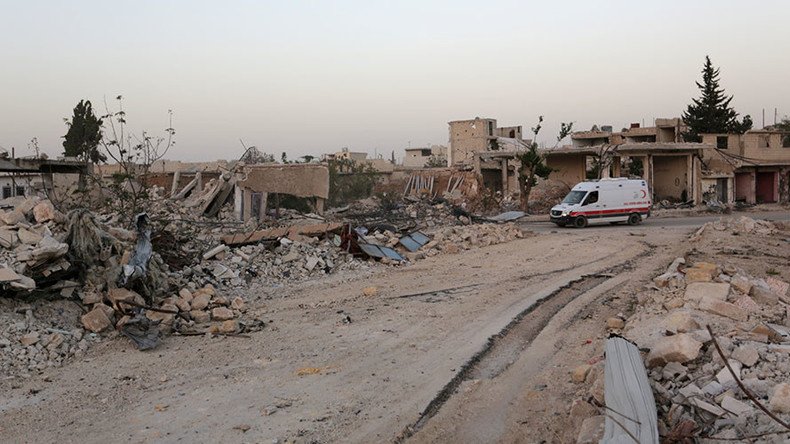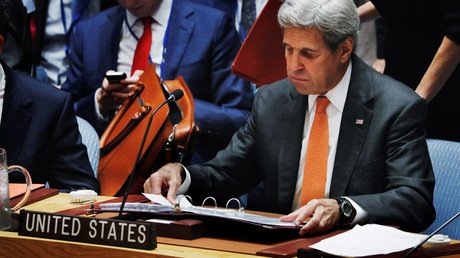‘US sanctions on Syria hamper aid efforts, help terrorists’

Because of US, EU sanctions, the aid groups operating in Syria have difficulties transferring funds into the country. Underground economies are on the rise as there is no way to trace where money is going, author Rania Khalek told RT.
A leaked United Nations report on the humanitarian impact of US and EU sanctions on Syria revealed they are hurting the population by creating difficulties for aid services to provide help in the war-torn areas.
The UN described the measures as "some of the most complicated … sanctions regimes ever imposed,” saying that they caused destabilization of every sector of the economy in Syria.
The report says: “The combined effect of … sanctions, terrorist concerns and the ongoing security environment have created immense hurdles for... humanitarian aid and... stabilization [in the region].”
RT discussed the report with Khalek, The Intercept’s author.
RT: Do you think this will mean the UN will push the US and EU to cancel sanctions?
Rania Khalek: I doubt that. There seems to be absolutely no admission or ability by the US government that these sanctions are hurting ordinary people. I asked the State Department for its response to the fact the UN is saying that these sanctions are the most extreme and far-reaching that has been imposed of any sanctions regime they could think of. The response was that any humanitarian issues…are all to be blamed on the Syrian government.
The U.S. and EU measures in Syria are “some of the most complicated and far-reaching sanctions regimes ever imposed” https://t.co/6rvtCEsUp2
— The Intercept (@theintercept) September 28, 2016
RT: This leaked report showed the US and EU sanctions haven't really been useful at all. Why do you think they are still pushing for more sanctions?
RK: There are a lot of people who are lobbying for sanctions, a lot of the advocates of the Syrian opposition in [Washington] DC, are pushing hard and have pushed hard from the very beginning for the severe sanctions. And the result of the fact is that Syria is a country that has been under US sanctions since 1979. So as soon as the uprising in Syria took place in 2011 and there was the tough crackdown from the government, the US immediately pushed for harder sanctions. That is just how it responds to any country that it doesn’t like. That is a way to ramp up the getting rid of the regime it doesn’t like. Sanctions are always the first you see.
You see it in Iran – the US had put sanctions on Iran; there are still sanctions on Iran now. Cuba has been under sanctions for several decades. And then there is Iraq, which was under the most extreme sanctions that were eventually the UN-led sanctions that led to the deaths of 500,000 children under the age of five. I have to say that the only reason sanctions the EU and the US have imposed on Syria, haven’t been as severe at this point is because the UN has not adopted them largely due to Russia, China vetoing any resolutions that have attempted to place sanctions on Syria.
RT: The transfer of funds into the country is now nearly impossible because of these sanctions. This has caused the rise of an unregulated network of money exchanges where groups like ISIS and Al-Qaeda can divert funds undetected. Is there any way this could have been avoided?
RK: Absolutely. The sanctions on the banks in Syria are so severe that literally Syrians cannot access bank accounts, they can’t access ATMs. The worst is that the aid groups cannot transfer funds into the country, or they have a very difficult time doing so. What has essentially happened – is this underground sort of like market, there is no transparency whatsoever - this network of money men has emerged. And of course this gives rise to underground economies. During the war this has given a rise to the war economy, and there is no way to trace where funds are going, because everything is in cash and remittance payments.
On the humanitarian side of things – what you have is that people can’t pay the aid workers, and they have to shut down various programs, or not deliver various items that are desperately needed. And in the case of groups like Al-Nusra and ISIS - it is easier for them or any other criminal to be messing with funds, or even embezzling, or getting money to places where they shouldn’t be going to – whether it’s to terrorist groups, or other criminal gangs.
US waging war from inside Syria by supporting terrorists
Westerns countries are pushing for more sanctions against Syria to hurt the legitimate government, independent US Presidential candidate Souraya Faas told RT. While having no boots on the ground, the US is supporting, training and helping terrorist organizations, she added.
The rise of an unregulated network of money exchanges cause by Western sanctions could have been avoided, she told RT.
“We need to take a look at those who are supporting the terrorists and ISIS. We’re looking at countries such as Saudi Arabia, Qatar, and Turkey. As we’ve all seen Hillary Clinton has put out videos several times where the Clinton Foundation, we’ve learned, has been receiving money from these governments. Now, what is the intention of that from the start? We all know that it has persuaded the opinion of the current administration in terms of supporting Saudi Arabia. The funding that is being sent to these terrorist organizations needs to stop, needs to stop from the government agencies within the US, as well as Saudi Arabia, Turkey and Qatar among others,” Faas told RT.
Last week the US ambassador to the UN Samantha Power, British counterpart Matthew Rycroft, and French ambassador Francois Delattre walked out of an emergency Security Council meeting on Syria on Sunday when the Syrian envoy started to speak.
“That shows their irresponsibility and how they are not taking the situation seriously. That is another issue we need to take a look at. We need to be able to identify: where do we stand? Are we looking to combat, genuinely combat the terrorism that is happening not just within Syria, but throughout the world; or are we siding with them?” Faas said.
As to why the US and EU keep pushing for more sanctions on Syria, Faas said that it is in order to “hurt the current Syrian government.”
“It is a legitimate government. It is sad to see what is going on. It is basically waging war from the inside what they are doing – without publically saying it. They don’t have boots on the ground like they did in Iraq. But guess what: by funding, training and helping these terrorist organizations they have basically infiltrated with sugar coating the names of different opposition groups and rebels. In the end they are all terrorists. If they are not combating the common denominator right now - this is terrorism – that means that they are also terrorists,” she told RT.
Souraya Faas said she still has family in Syria, including in Aleppo and, in her words, the Assad government has not “in any way relieved itself from its obligations.”
“There is food, there are a lot of things – it is normal daily life. What they need to do is stop the terrorism,” she said. But that’s difficult to achieve when “the Russians and the Syrian current government are combating these terrorists, and then you have the US shooting down the Syrian Army [jet].”
“That is what causing more problems, because it is allowing the terrorists to advance,” Faas told RT.
Faas says the US is worried that as “a superpower” it sees Russia in Syria and being “the actual hero in combating terrorism.” That makes Washington feel it has been left behind, she added.
The statements, views and opinions expressed in this column are solely those of the author and do not necessarily represent those of RT.













